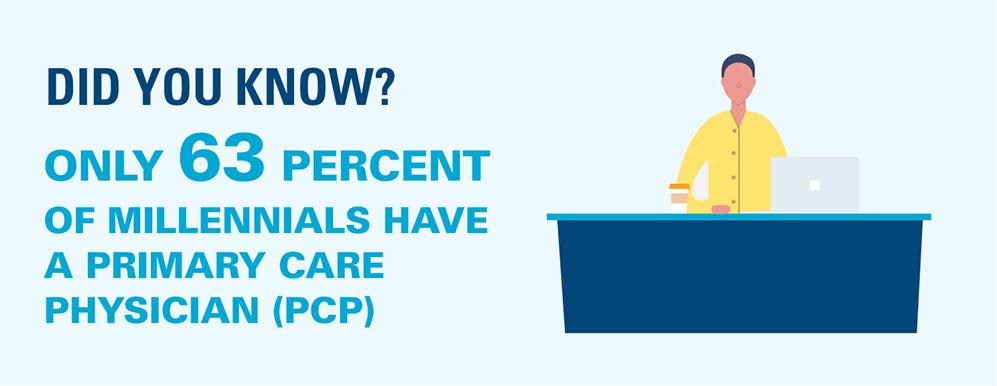A digital approach to millennial health
Is digital engagement the key to reaching and empowering millennials to take control of their health? In our cross-country listening sessions, we’re finding that the answer may be “yes”—but the millennials we talked to are looking for far more than just another app.
“Healthcare is like Facebook in an Instagram world,” said one millennial participant in our sessions. “It’s not keeping in step with current needs and wants.”

As we’ve seen in our Blue Cross Blue Shield, The Health of Millennials Report®, millennials don’t seem to be fully engaging with their health benefits. For example, only 63 percent have a primary care provider (PCP), leaving 37 percent without consistent access to preventive care. To compare that to their older co-workers and colleagues, only 9 percent of Gen Xers don’t have a PCP.
While it’s clear millennials are looking for better ways to interact with the healthcare system, it’s not exactly clear what that means. For example, in a recent Blue Cross Blue Shield (BCBS) National Millennial Health survey, we found that two-thirds of millennials are aware of telemedicine yet only 14 percent have used it. For those who have used it, the majority (66 percent) are satisfied and would use it again. Only 20 percent of millennials say they would not try telemedicine and 31 percent are undecided, so there is an opportunity to increase use by providing better access.
Defining digital engagement in healthcare

If using digital tools is a possible solution to help us create a better overall healthcare experience for millennials, where do we start? What do we need to consider as we move forward? We asked our different listening tour participants to explain how they see digital playing a bigger role in the world of healthcare. Here are some of their responses:
- Majority use digital tools to track their health and get answers to health questions. They also expect providers to have online scheduling, and they see the ability to schedule appointments online as table stakes.
- Millennials want healthcare that is individualized to their needs and easy to access, reflecting the experience they receive with digital solutions and apps, like Kayak and Uber, further noting that these solutions meet them where they are.
- Speaking of apps, instant gratification or gamification to improve health engagement would be valuable. An example they shared was being able to know the immediate impact on their health from the foods they eat
- In addition to apps, millennials want providers to communicate with them through the same digital tools they use to communicate with everyone else, such as text and email.
- Millennials want access to their medical records so the information is easily shareable with whomever they choose. The BCBS national survey supported this point, finding that 87 percent of millennials are comfortable having total control of their medical records.
- Millennials also want instant access to information on health, wellness and cost, adding that any type of engagement needs to be authentic and customized. At the same time, they felt as though there is an oversaturation of information online, and it’s difficult to access the information you need efficiently without being overwhelmed by too much content.
- Not all millennials want a cookie cutter experience for something that’s as important as their health. Some may want telehealth while others may prefer an office visit. They want choices in accessing healthcare, and choices should be convenient and accessible, like longer/later office hours or the option to text/email doctors.
Avoiding information overload
Our conversations with millennials also came with an important caveat; app and information overload is very real. When introducing a new app or digital solution, it needs to solve a problem, provide a service that is currently unmet and should be something that encourages regular use. Additionally, the millennials we talked to admitted that they often don’t fully understand their benefits, how to access them or how the health system works. More education should be a key component of the solution.
Making real connections with providers
We also can’t dismiss the fact that although technology can be helpful and provide convenience for millennials, they still want to build relationships with their doctors. Like generations before them, millennials want to work with doctors and counselors who understand them and are invested in them. Is there a way to facilitate these kinds of connections? Can we create a tool or program that matches employees with providers based on shared attributes like gender identity, age, temperament and so on?
The more we listen and learn, the more ideas and solutions we can bring to the workplace and our healthcare system. After all, two-thirds of millennials in the BCBS survey said they are looking for new ways to live a healthier life. Together, we have the data and insights to help them get there.